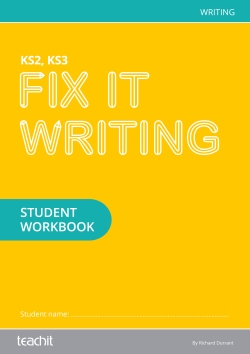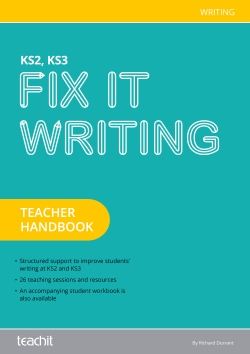Fix it writing - teacher handbook and student workbook
Structured writing intervention support to improve English students’ writing skills
Fix it writing has been designed to support English teachers, non-specialist teachers and teaching assistants in identifying and ‘fixing’ problems in students’ writing. It's ideal for targeted support and intervention sessions at KS3 for struggling writers. It’s also suitable for upper key stage two.
The photocopiable, downloadable teacher handbook provides a structured sequence of 26 writing intervention teaching sessions and lesson resources, with detailed guidance on how to deliver these sessions to develop learners’ core skills. It includes evidence-based, explicit instruction for teachers alongside chapters on: writing and punctuating sentences; planning, organising and linking ideas and paragraphs and choosing effective words.
Research-based and designed for small group or whole-class sessions, this writing intervention pack helps learners to understand the writing process and text structure. If you are teaching writing skills or sentence writing, these resources will students to feel more confident.
The photocopiable student workbook includes all the classroom activities, graphic organisers, checklists and worksheets to accompany the teacher handbook, enabling students to improve and build on their core English writing skills.
You may also be interested in Fix it reading, a new reading intervention programme for KS3 students designed to build learners’ reading comprehension skills.
What's inside?
Introduction (pages 4-25)
- Progression in writing: a framework
- Summary of the Fix it writing skill focuses
- Making sense of students’ writing
- Setting targets and planning sessions
- Fix it session structure
- Getting the most out of Fix it
Chapter 1: Writing and punctuating sentences (pages 26-36)
- Session 1: Capital letters and full stops
- Session 2: Ending sentences
- Ways to improve
Chapter 2: Using conjunctions (pages 37-49)
- Session 1: Varying conjunctions
- Session 2: To suit purpose
- Ways to improve
Chapter 3: Using commas (pages 50-66)
- Session 1: Lists and clarity
- Session 2: Clarity and effect
- Ways to improve
Chapter 4: Varying sentences (pages 67-82)
- Session 1: Sentence starts and word order
- Session 2: Varying for effect
- Ways to improve
Chapter 5: Expanding sentences (pages 83-97)
- Session 1: Adding detail
- Session 2: Relative clauses
- Ways to improve
Chapter 6: Using verbs (pages 98-108)
- Session 1: Identifying verbs
- Session 2: The past
- Ways to improve
Chapter 7: Generating and sorting ideas (pages 109-120)
- Session 1: Non-fiction
- Session 2: Fiction
- Ways to improve
Chapter 8: Sequencing and organising texts (pages 121-132)
- Session 1: Non-fiction
- Session 2: Fiction
- Ways to improve
Chapter 9: Organising paragraphs (pages 133-144)
- Session 1: Topic sentences
- Session 2: Writing paragraphs
- Ways to improve
Chapter 10: Cohesive devices (pages 145-157)
- Session 1: To suit purpose
- Session 2: Comparing and contrasting
- Ways to improve
Chapter 11: Linking paragraphs (pages 158-171)
- Session 1: Adverbs and determiners
- Session 2: Making comparisons
- Ways to improve
Chapter 12: Writing formally (pages 172-180)
- Session 1: Choosing the right words
- Session 2: Choosing the right tone
- Ways to improve
Chapter 13: Choosing effective words (pages 181-190)
- Session 1: Setting and atmosphere
- Session 2: Creating atmosphere/characters
- Ways to improve
This sample is from the Fix it writing - student workbook:
Ending sentences
Sentences sometimes end with exclamation marks or question marks. Exclamations are used at the end of sentences to show a strong emotion such as surprise, horror or excitement, or which include a command or order. Question marks are used at the end of sentences which ask a question.
There are four sentences below. End each of these with a full stop, question mark or exclamation mark.
-
How much did the ice-cream cost
-
More and more people arrived
-
Look out
-
What an enormous queue
Your own sentences
Now write out some of your own sentences about a fairground. Practise writing a range of sentences, so that you include questions and exclamations too. Use exclamation marks, question marks and full stops to end the sentences.
What have you learned?
Write down two important things you have learned in this session.
Say how you will use that learning before the next session.
All reviews
Have you used this resource?
Review this resource29/07/2020
31/05/2020
27/05/2020
14/05/2020
07/05/2020
07/05/2020
28/04/2020
23/04/2020
11/04/2020
27/03/2020


